
John Winston Ono Lennon was an English singer, songwriter and musician who gained worldwide fame as the founder, co-songwriter, co-lead vocalist and rhythm guitarist of the Beatles. His work included music, writing, drawings and film. His songwriting partnership with Paul McCartney remains the most successful in history.

Please Please Me is the debut studio album by the English rock band the Beatles. Produced by George Martin, it was released in the UK on EMI's Parlophone label on 22 March 1963. The album is 14 songs in length, and contains a mixture of cover songs and original material written by the partnership of band members John Lennon and Paul McCartney.
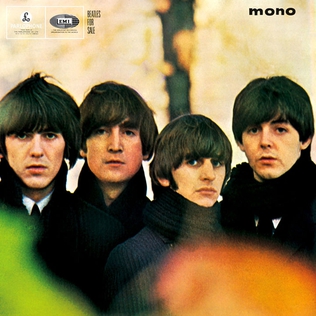
Beatles for Sale is the fourth studio album by the English rock band the Beatles. It was released on 4 December 1964 in the United Kingdom on EMI's Parlophone label. The album marked a departure from the upbeat tone that had characterised the Beatles' previous work, partly due to the band's exhaustion after a series of tours that had established them as a worldwide phenomenon in 1964. Beatles for Sale was not widely available in the US until 1987, when the Beatles' catalogue was standardised for release on CD. Instead, eight of the album's fourteen tracks appeared on Capitol Records' concurrent release, Beatles '65, issued in North America only.
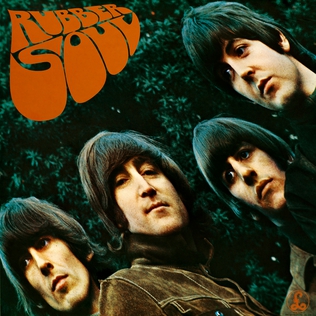
Rubber Soul is the sixth studio album by the English rock band the Beatles. It was released on 3 December 1965 in the United Kingdom on EMI's Parlophone label, accompanied by the non-album double A-side single "Day Tripper" / "We Can Work It Out". The original North American release, issued by Capitol Records, contains ten of the fourteen songs and two tracks withheld from the band's Help! album. Rubber Soul was described as an important artistic achievement by the band, meeting a highly favourable critical response and topping sales charts in Britain and the United States for several weeks.

Let It Be is the twelfth and final studio album by the English rock band the Beatles. It was released on 8 May 1970, almost a month after the group's public break-up, in tandem with the documentary of the same name. Concerned about recent friction within the band, Paul McCartney had conceived the project as an attempt to reinvigorate the group by returning to simpler rock 'n' roll configurations. Its rehearsals started at Twickenham Film Studios on 2 January 1969 as part of a planned television documentary showing the Beatles' return to live performance.

"Strawberry Fields Forever" is a song by the English rock band the Beatles, written by John Lennon and credited to Lennon–McCartney. It was released on 13 February 1967 as a double A-side single with "Penny Lane". It represented a departure from the group's previous singles and a novel listening experience for the contemporary pop audience. While the song initially divided and confused music critics and the group's fans, it proved highly influential on the emerging psychedelic genre. Its accompanying promotional film is similarly recognised as a pioneering work in the medium of music video.

"Norwegian Wood (This Bird Has Flown)" otherwise known as simply "Norwegian Wood", is a song by the English rock band the Beatles from their 1965 album Rubber Soul. It was written mainly by John Lennon, with lyrical contributions from Paul McCartney, and credited to the Lennon–McCartney songwriting partnership. Influenced by the introspective lyrics of Bob Dylan, the song is considered a milestone in the Beatles' development as songwriters. The track features a sitar part, played by lead guitarist George Harrison, that marked the first appearance of the Indian string instrument on a Western rock recording. The song was a number 1 hit in Australia when released on a single there in 1966, coupled with "Nowhere Man".

"Twist and Shout" is a 1961 song written by Phil Medley and Bert Berns. It was originally recorded by The Top Notes, but it did not become a hit in the record charts until it was reworked by the Isley Brothers in 1962. The song has been covered by several artists, including the Beatles, Salt-N-Pepa, and Chaka Demus & Pliers, who experienced chart success with their versions.

"Something" is a song by the English rock band the Beatles from their 1969 album Abbey Road. It was written by George Harrison, the band's lead guitarist. Together with his second contribution to Abbey Road, "Here Comes the Sun", it is widely viewed by music historians as having marked Harrison's ascendancy as a composer to the level of the Beatles' principal songwriters, John Lennon and Paul McCartney. Two weeks after the album's release, the song was issued on a double A-side single, coupled with "Come Together", making it the first Harrison composition to become a Beatles A-side. The pairing was also the first time in the United Kingdom that the Beatles issued a single containing tracks already available on an album. While the single's commercial performance was lessened by this, it topped the Billboard Hot 100 in the United States as well as charts in Australia, Canada, New Zealand and West Germany, and peaked at number 4 in the UK.

"Paperback Writer" is a song by the English rock band the Beatles. Written primarily by Paul McCartney and credited to the Lennon–McCartney partnership, the song was released as the A-side of their eleventh single in May 1966. It topped singles charts in the United Kingdom, the United States, Ireland, West Germany, Australia, New Zealand and Norway. On the US Billboard Hot 100, the song was at number one for two non-consecutive weeks, being interrupted by Frank Sinatra's "Strangers in the Night".

"Wait" is a song by the English rock band the Beatles from their 1965 album Rubber Soul. The song is credited to the Lennon–McCartney partnership. In the 1997 book Many Years from Now, Paul McCartney recalls it as entirely his work. In a 1970 interview with Ray Connolly, John Lennon could not remember writing it, saying, "That must be one of Paul's."
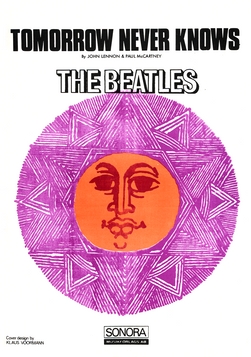
"Tomorrow Never Knows" is a song by the English rock band the Beatles, written primarily by John Lennon and credited to Lennon–McCartney. It was released in August 1966 as the final track on their album Revolver, although it was the first song recorded for the LP. The song marked a radical departure for the Beatles, as the band fully embraced the potential of the recording studio without consideration for reproducing the results in concert.
The Great American Songbook is the loosely defined canon of significant 20th-century American jazz standards, popular songs, and show tunes.

"The Night Before" is a song by the English rock band the Beatles from their 1965 film Help! and soundtrack album of the same name. It was written primarily by Paul McCartney and credited to the Lennon–McCartney partnership. Described as a pop rock or rock and roll song, its lyrics reflect on the singer's last night with his lover before being abandoned.
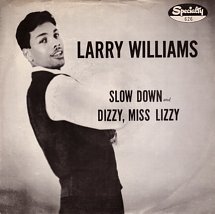
"Slow Down" is a rock and roll song written and performed by Larry Williams. Recorded in 1957, AllMusic writer Stewart Mason describes it as "raucous enough to be punk rock nearly a full two decades before the concept was even in existence." Specialty Records released it as a single in 1958, but only the second-side "Dizzy, Miss Lizzy" reached the record charts. Both songs were later covered by the Beatles.
Nicholas Schaffner was an American non-fiction author, journalist, and singer-songwriter.
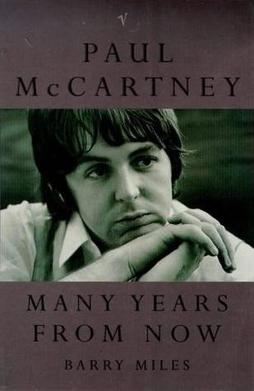
Paul McCartney: Many Years from Now is a 1997 biography of Paul McCartney by Barry Miles. It is the "official" biography of McCartney and was written "based on hundreds of hours of exclusive interviews undertaken over a period of five years", according to the back cover of the 1998 paperback edition. The title is a phrase from McCartney's song "When I'm Sixty-Four", from the Beatles' 1967 album Sgt. Pepper's Lonely Hearts Club Band. The book was first published in the United Kingdom in October 1997 by Secker & Warburg.
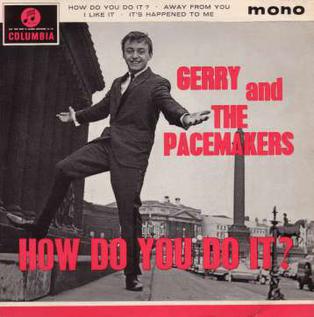
"How Do You Do It?" is a song, written by Mitch Murray. It was recorded by Liverpudlian band Gerry and the Pacemakers, and became their debut single. This reached number one in the UK Singles Chart on 11 April 1963, where it stayed for three weeks.

The Ivors Academy is one of the largest professional associations for music writers in Europe. The academy exists to support, protect, and campaign for the interests of songwriters, lyricists, and composers. It represents music writers of all genres and has approximately 2000 members.

The Fifth Beatle is a graphic novel by writer Vivek Tiwary, artist Andrew Robinson, and cartoonist Kyle Baker. It debuted in Italy as part as the tenth anniversary of the country's Rolling Stone magazine and was published by Dark Horse Comics in November 2013.

















